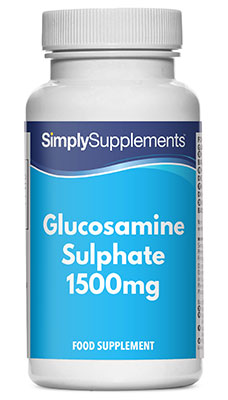Health Benefits of Glucosamine

Glucosamine is popularly used to support joint function, particularly against the general wear and tear of cartilage, and has become one of the world’s leading food supplements for the treatment of arthritis.
Although glucosamine is naturally produced by the human body, supplements have become popular dietary supports to replenish the body’s natural supply. There are two main types of glucosamine in supplement form; glucosamine sulphate and glucosamine hydrochloride.
To date, glucosamine sulphate is the most widely used and extensively studied, while glucosamine hydrochloride is a vegetarian alternative for which the emerging evidence is promising. There is some evidence that glucosamine supplements can help to:
• Improve pain and joint function in people with osteoarthritis, particularly of the knee or hip
• Slow the degradation of joint cartilage and the progression of age-related joint conditions
What is Glucosamine?
 Glucosamine is an amino sugar which plays an important role in the body’s production of glycosaminoglycan’s and glycoproteins. These are the essential building blocks of joint ligaments, tendons, cartilage and synovial fluid.
Glucosamine is an amino sugar which plays an important role in the body’s production of glycosaminoglycan’s and glycoproteins. These are the essential building blocks of joint ligaments, tendons, cartilage and synovial fluid.
As we age, the body produces less of these joint-supporting compounds, which means that glucosamine stores in the cartilage are not replaced as efficiently as they once were. Over time this leaves cartilage vulnerable to wear and tear.
There are no dietary sources of glucosamine so it needs to be consumed in supplement form. Glucosamine supplements are manufactured from several different sources. Glucosamine sulphate is sourced from chitin found in the exoskeletons of shellfish such as shrimp, lobster and crabs, while glucosamine hydrochloride is derived from vegetarian sources such as maize.
Benefits of Glucosamine
Osteoarthritis is a debilitating condition which negatively affects joint health by causing damage and restricting movement, leading to pain and a reduced quality of life. In the UK, it is thought that osteoarthritis affects almost 9 million people. Most people suffering with osteoarthritis use anti-inflammatory pain killers to manage their symptoms.
Many clinical trials in the area of glucosamine supplementation have focused on the treatment of osteoarthritis of the knee, hip and spine. They appear to show that glucosamine may slow the breakdown of cartilage in the joints, reducing the progression of osteoarthritis and the need for knee replacement surgery.
In 2006, the findings from GAIT (the Glucosamine & Chondroitin Arthritis Intervention Trial) were released. This 24-week study involved 1,600 patients with osteoarthritis of the knee and the findings appear to show that glucosamine sulphate supplements lessened pain in patients with mild-to-moderate symptoms, although they didn’t appear to be as beneficial for those with severe osteoarthritis.
Another useful trial found that taking glucosamine sulphate over a six-month period may be as effective as over-the-counter pain medications in relieving knee pain caused by osteoarthritis. However, glucosamine didn’t relieve pain for everyone and the findings have raised questions for further research.
A separate meta-analysis released in 2013 drew data from 19 trials and concluded that glucosamine sulphate was significantly more effective at improving knee function in osteoarthritis patients when compared to a placebo.
Excessive wear and tear of joint cartilage can also be caused by injuries or strains, which further accelerate the progression of joint conditions such as osteoarthritis. However, to date, there is insufficient evidence that glucosamine can be beneficial in treating sporting injuries or chronic lower back pain due to poor quality trials.
How Does Glucosamine Work?
Although the precise mechanism behind the joint-supporting effects of glucosamine supplementation is unclear, it is thought that glucosamine supplements may exert benefits by ‘topping up’ the body’s natural supply. It is also thought that glucosamine may inhibit inflammatory cytokines, leading to a reduction in collagen breakdown.
How Much Glucosamine Should I Take?
 Studies which have shown glucosamine to be beneficial have involved daily supplementation of 1,500mg glucosamine sulphate. Glucosamine hydrochloride has not been as heavily-researched; though strengths typically vary from 750mg to 1,500mg.
Studies which have shown glucosamine to be beneficial have involved daily supplementation of 1,500mg glucosamine sulphate. Glucosamine hydrochloride has not been as heavily-researched; though strengths typically vary from 750mg to 1,500mg.
Studies suggest that some individuals begin to feel the benefits of glucosamine supplementation within a few days. However, for the majority, the positive effects will take between 4 -12 weeks before being felt. If you are one of the few unfortunate individuals who do not feel a benefit from glucosamine, it is recommended that you stop taking the supplement after six months of daily provision.
Children under the age of 14 years and pregnant women are not advised to take either form of glucosamine because the safety evidence is lacking. For more information, we would advise you speak to your doctor.
Many pet owners find that daily glucosamine supplements can benefit their cats or dogs. There are many glucosamine supplements on the market specifically formulated for animals, so check the label for dosage instructions.
Is Glucosamine Effective Alongside Other Nutrients?
Glucosamine may be at its most effective when combined with other nutrients that have roles in helping our joints function normally. Currently on the market, there are a range of formulas that may work in synergy with glucosamine to help support healthy joints.
A very popular partner to glucosamine is chondroitin, which is also another vital component of cartilage. Chondroitin supplementation has been investigated in numerous randomised control trials and has consistently been shown to reduce pain and painkiller usage in individuals who suffer from osteoarthritis.
Glucosamine products are also regularly enriched with vitamin C. Vitamin C, also known as ascorbic acid, is a water-soluble vitamin, meaning that it cannot be stored by the body. As a result, daily intake of vitamin C is essential for good health. Alongside an array of other important roles in the body, vitamin C contributes to the normal function of bones and cartilage, as well as the formation of collagen. Vitamin C is also an antioxidant vitamin, meaning that it helps to protect cells from oxidative stress. Older adults often have high levels of inflammatory markers which can irritate joint tissues, meaning that achieving the recommended vitamin C intake is very important.
Many individuals also choose to take glucosamine in combination with calcium. Calcium is well-known to have an abundance of roles in promoting good musculoskeletal health. As there are a variety of comprehensive glucosamine formulas on the market, you will not be hard pressed in finding the right product for you.
Glucosamine Side Effects and Complications
Glucosamine supplements are generally safe, with only a few mild side effect reported such as stomach cramps, constipation and diarrhoea. If you are allergic to shellfish, you should avoid using Glucosamine sulphate; however the hydrochloride form is safe for your use.
Glucosamine sulphate may also not be suitable for individuals who are looking to reduce salt intake. This is because many glucosamine sulphate formulas are stabilised with sodium chloride (table salt). Some glucosamine sulphate products can contain around a third of salt, so taking 1,500mg per day will provide a large dose of sodium. To negate this, either supplement with glucosamine hydrochloride or seek a high quality glucosamine supplement that is stabilised with potassium chloride (2KCI).
Moreover, there has been some debate surrounding glucosamine sulphate's potential effect on blood glucose management. Preliminary scientific observations proposed that glucosamine supplementation was linked to insulin resistance. Insulin resistance means that the body cannot efficiently dispose of glucose into cells, leading to high blood sugar levels. Chronic high blood sugar (diabetes) can lead to serious health compilations such as heart disease, visual impairment and also kidney and nerve damage.
Thankfully, follow-up studies with robust methodologies rebutted this claim, finding that supplementing with glucosamine does not affect glucose metabolism. Even though the link to insulin resistance has been refuted, it is advised that individuals with impaired glucose tolerance exercise caution before beginning glucosamine supplementation.
Glucosamine shouldn’t interact with any medications, however if you are taking any kind of prescription medication, always speak to your GP before taking supplements. People with chronic liver disease should take particular care.
To Summarise
- Glucosamine is a very popular supplement that may contribute to the support of health joints.
- Glucosamine is naturally occurring in our bodies and is needed for the production of various joint tissues.
- Although it is not currently known how glucosamine works, scientists believe glucosamine increases the availability of substrates for building joint tissues and reduces inflammatory markers that breakdown collagen.
- Glucosamine is a safe supplement to take, with only minor side-effects noted by some people.
- Glucosamine comes in two different forms, sulphate or hydrochloride. Glucosamine sulphate is the more researched form, but is not suitable for people aiming to reduce salt intake, vegetarians, or individuals with a seafood allergy.
- The majority of people feel a benefit after a few weeks of daily glucosamine provision.
- With regards to dosage, most people take between 1,500 and 3,000mg per day. It is recommended that glucosamine is taken at meal times.
- Glucosamine is popularly taken with chondroitin and other nutrients such as vitamin C and calcium, which have important roles in bone and joint health.
Shop for Glucosamine Supplements here

Sources:
https://www.ncbi.nlm.nih.gov/pubmed/20847017
https://www.ncbi.nlm.nih.gov/pubmed/19724889
https://www.ncbi.nlm.nih.gov/pubmed/17257091
https://www.ncbi.nlm.nih.gov/pubmed/16495392
https://www.ncbi.nlm.nih.gov/pubmed/15846645

 Nicole
Nicole 

























